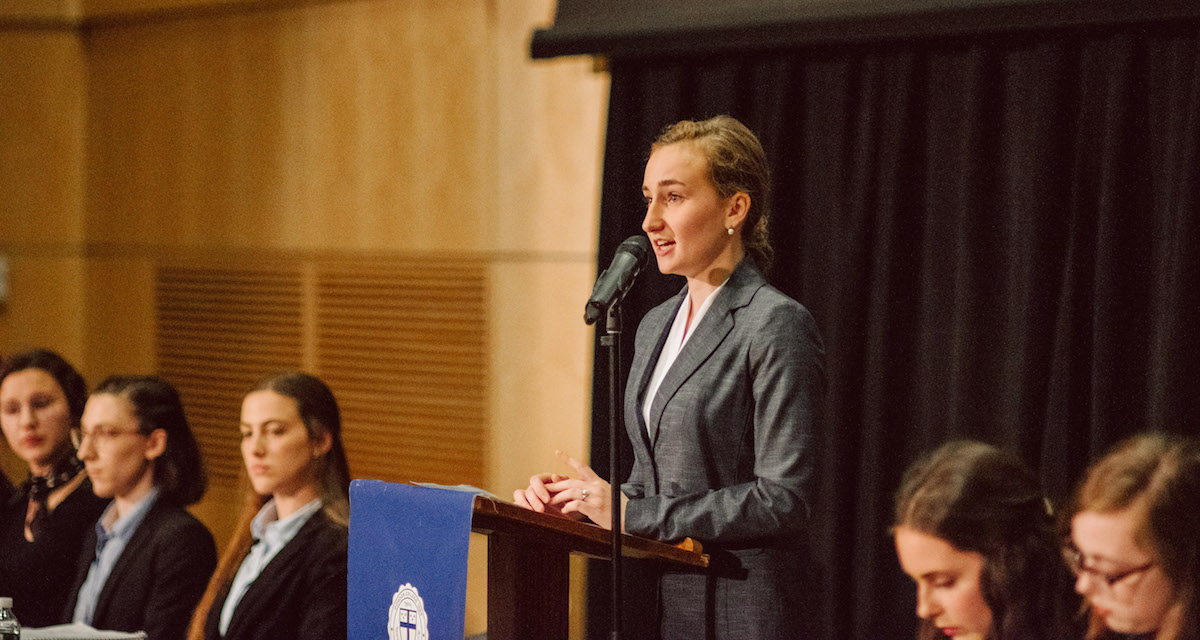JAF Debate 2019: Missions from Jerusalem, to Athens, to the Ends of the Earth
For 15 years, the annual Jerusalem and Athens Forum (JAF) debate has provided a platform for some of the most pressing questions concerning modern-day Christianity. JAF is a year-long, great books honors program that encourages students to look critically at the areas where the Church (symbolized by Jerusalem) and the academy (embodied by Athens) overlap. The debate is the culmination—a chance for students to show their ability to engage deeply with viewpoints they may not hold personally. This year, the debate focused on bringing awareness to the Great Commission, with teams assigned to either support or refute the statement: “Modern models of Christian missions should be discarded as a relic of colonialism.”
Missions is a core part of Gordon College’s identity. In 1889, it was founded as missionary training school, with the purpose of preparing its graduates for service to the Belgian Congo. Today, almost 18 student groups traverse the globe during semester breaks to serve international communities in Asia, Africa and Central America. However, the long-term impact of short-term missions has been long debated.
“Questions concerning the character of Christian missions are rampant within the larger culture and, within Christian circles, the debate continues concerning the appropriateness of missions and evangelism, and also concerning the methods and the means of missions,” says Dr. Paul Brink, co-director of the JAF program. “These are also the types of questions with which JAF is vitally concerned.”
But, the debate is not based on personal opinion. It’s an exercise in oratory, so JAF scholars are randomly assigned to teams—regardless of their personal stance. In the end, the audience chooses the winning team based on who made the most compelling case.
“We spent countless hours [researching] together, and it ended up being a really wonderful experience,” said Chloe Larson ’19 (from the negative team). “JAF does a great job of bringing [us] together around a table of equal intellectual curiosity.”
That curiosity made for an exciting debate, in which both teams made sound, well-supported arguments. The affirmative side insisted that today’s mission models are laced with attitudes and practices dating back to colonialism, supporting their assertion with evidence of “white savior” mentalities, forced baptisms and mission trips that appear more like vacations. The team implored the global Church to discard current models and brainstorm new ones, free from colonial ties, to show dignity to those being served.
On the other hand, after acknowledging the existing flaws of some current mission models, the negative side stated that other existing mission models have many positive aspects, from long-term community building to effective discipleship programs to entrepreneurial startups. They advocated for the global Church to push for mission reform, and to not completely discard current methods.
The debate audience elected the negative team as the victor, though both teams felt the real victory was found in bringing attention to this topic. Regardless of their differences, both teams conceded that current mission models are due for a change.
“We created a discussion here on Gordon’s campus and hopefully brought awareness to issues that people don’t think about with regard to missions,” said Sarah Welton-Lair ’21 (from the affirmative team). “I hope that this discussion continues.”
By Sydney Cooney ’19, English language and literature
 The Bell
The Bell